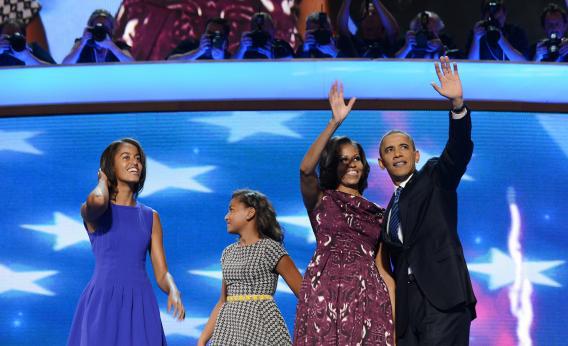Democrats put forward a bold, confident face at this year’s Democratic National Convention, and this attitude extended to reproductive rights. Speaker after speaker expressed support for a woman’s right to choose, without all the hand-wringing and shaming that often accompanies even pro-choice discussions of abortion rights. Obama capped it off last night with:
If you give up on the idea that your voice can make a difference, then other voices will fill the void: lobbyists and special interests; the people with the $10 million checks who are trying to buy this election and those who are making it harder for you to vote; Washington politicians who want to decide who you can marry or control health care choices that women should make for themselves.
This kind of language is a far cry from the “safe, legal, and rare” framing that centrist liberals like Bill Clinton came up with in the ‘90s. Even Obama used to discuss abortion in terms of how emotionally painful it is. While I appreciated that his image of a woman agonizing over her choices was an implicit argument against anti-choicers who portray women who get abortions as promiscuous bimbos, focusing on the women who struggle under the moral weight of the decision to have an abortion suggests that some women are more deserving of rights than others.
I strongly doubt that Obama thinks a woman who comes to her decision to abort quickly and without grief is any less moral a person than one who cries and spends a lot of time debating her options. So it’s good to see him abandon the pretense. It’s also more in line with how women actually feel about abortion; a survey of the research on mental health and abortion conducted by the American Psychological Association found that most women feel relieved and happy after their abortions, for the same reason that anyone feels relieved after solving what feels like a serious problem.
The Democrats actually dropped the “safe, legal, and rare” language from their platform this year in exchange for a bolder statement of support for reproductive rights. This suggests a deliberate strategy, and one unlikely to go away any time soon.
Not that everyone is happy with the decision. Liberal commentator Margaret Carlson is irate about the party’s newly nonapologetic pro-choice stance. Why? She’s pro-choice, of course. She just thinks support for abortion right should be accompanied with a dose of disapproval.
Abortion is a more delicate subject than our fierce, partisan arguments would have it. If you scroll backward, an intimate act (a horrible one in cases of rape or incest) occurred and a woman is pregnant. Most people outside partisan bubbles don’t like to talk, much less scream, about such things.
The notion that people forget about the fill-in-your-euphemism-for-dirty-filthy-sex that got a woman “in trouble” is so naive that I have to question Carlson’s sincerity. In the 21st century, reproductive rights battles extend far beyond abortion and encompass overtly anti-sex initiatives such as defunding contraception subsidies, fighting the contraception mandate, and pushing for abstinence-only programs in schools. But Carlson is wrong to believe that shaking our heads in disapproval at “intimate acts” can help the cause; it only gives more credence to prudish narratives that are used in support of restricting abortion rights.
“Safe, legal, and rare” was a phrase that was intended to convey the notion that we can reduce the need for abortion by attacking its primary cause: unintended pregnancy. Clinton likely hoped that audiences would hear “safe, legal, and rare” and conjure images of better sex education and better access to contraception. Instead, it was read by many people as a call to reduce abortion by pushing more pregnant women to keep their pregnancies through a combination of shaming them and restricting their access to abortion. The myth that women who get abortions are just lost girls who need to find their way—and that having a baby could set them on the proper path—turns out to have more cultural power than boring old policy discussions about interventions that improve contraception use.
The past couple of decades, which have seen a growth in the power of anti-choice narratives and restrictions on abortion rights, demonstrate that offering qualified support for abortion rights doesn’t work. It’s time for a different strategy, and it’s good that the Democrats are finally coming around to seeing this.
Read the rest of Slate’s coverage of the Democratic National Convention.
